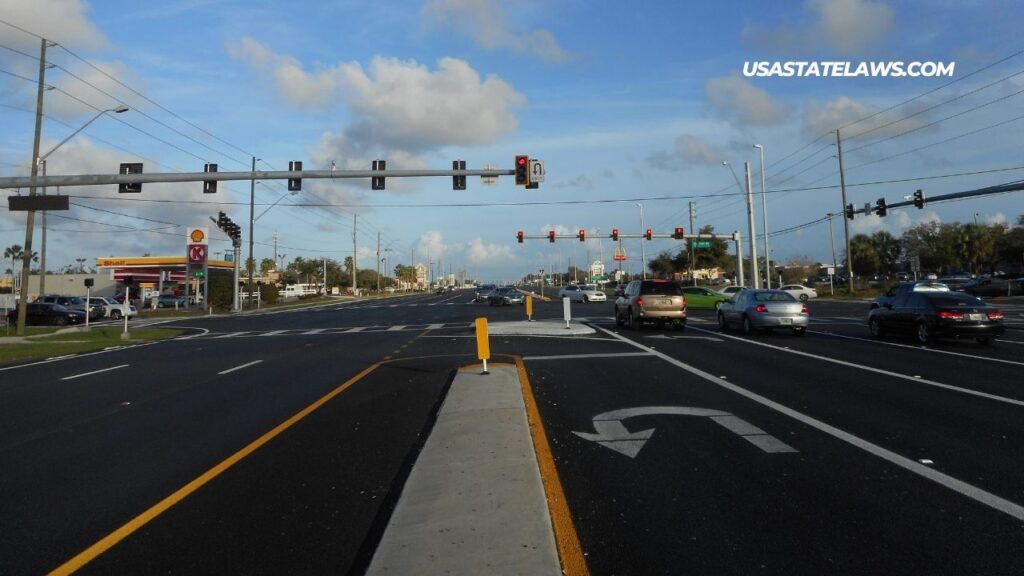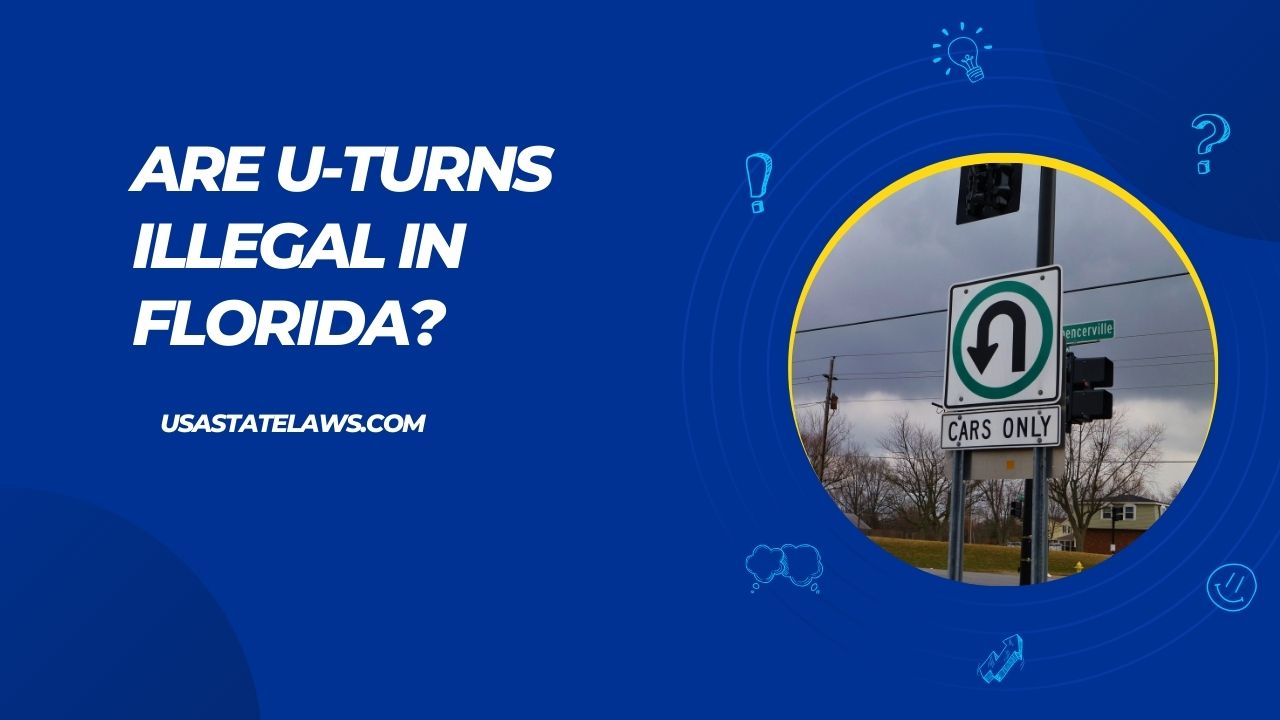Are U-turns Illegal In Florida? U-turns are generally legal in Florida unless posted otherwise, but drivers must ensure they do not interfere with oncoming traffic.
U-turns are a common maneuver for drivers who want to reverse direction quickly, whether due to missing a turn or needing to access a destination on the opposite side of the road.
However, the legitimacy of U-turns differs by state, with each one carrying its own distinct laws and regulations.
In Florida, the rules surrounding U-turns are particularly important due to the state’s unique roadways, which include high-traffic urban areas, wide highways, and zones with heavy pedestrian activity.
In this article, we will dive deep into Florida’s laws concerning U-turns, including where and when they are permitted, and the penalties drivers may face for making an illegal U-turn.
We’ll also cover tips on how to make U-turns safely and legally. [Are U-turns Illegal In Florida?]
By the end, you’ll have a clear understanding of whether U-turns are illegal in Florida, and how to avoid unnecessary fines or accidents by following the state’s guidelines.
Contents
What Is a U-Turn?
Definition of a U-Turn
A U-turn refers to a driving action in which a driver makes a 180-degree turn to reverse the direction of the vehicle. [Are U-turns Illegal In Florida?]
This maneuver is typically performed at an intersection or a designated area of the road, allowing the driver to switch from one side of the road to the other in order to head in the opposite direction.
Common Situations for U-Turns
U-turns are common for several reasons:
- Missed turns or exits: One of the most frequent reasons drivers perform U-turns is because they’ve missed a turn or exit. Rather than continuing down the road and wasting time, a U-turn allows them to correct their course and head back to the desired route.
- Shortcuts or faster routes: In some cases, drivers use U-turns to avoid making long, convoluted routes to access the other side of the road or a destination. U-turns provide a quicker, more direct alternative.
- Navigational adjustments: With modern GPS systems often recalculating routes, U-turns can be recommended when drivers miss a planned route or need to change course due to traffic or construction.
Are U-Turns Legal in Florida?
General Legality of U-Turns
In Florida, U-turns are generally legal as long as they are performed safely and in accordance with traffic control devices. [Are U-turns Illegal In Florida?]
Drivers are allowed to make U-turns at most intersections and along many stretches of road, provided there are no signs indicating that the maneuver is prohibited.
Conditions for Legal U-Turns
For a U-turn to be legal in Florida, several conditions must be met:
- No posted restrictions: The most important factor is that there should be no signage explicitly prohibiting U-turns. Signs such as “No U-Turn” or similar warnings should be observed to avoid violating the law.
- Safe execution: Drivers must be able to execute the U-turn without endangering themselves or other road users. This means ensuring there is ample space and no oncoming traffic that could be disrupted by the turn.
- Adherence to traffic signals: If a U-turn is performed at an intersection, drivers must follow any traffic signals or signs. For example, a red light or a “No U-Turn” signal overrides the general legality of the maneuver.
Traffic Signals and Their Role in U-Turns
Traffic signals play a crucial role in regulating U-turns at intersections. In some cases, there may be specific signals that allow or prohibit U-turns, such as green arrows or dedicated U-turn lanes.
Failure to comply with these signals can result in fines or penalties. [Are U-turns Illegal In Florida?]
Always check for signals before attempting a U-turn, especially in busy intersections where traffic control is more complex.

Where Are U-Turns Prohibited in Florida?
While U-turns are allowed in many locations, there are specific areas in Florida where they are prohibited for safety and traffic flow reasons.
These locations include intersections, highways, and zones where visibility or traffic conditions make U-turns dangerous. [Are U-turns Illegal In Florida?]
Near Intersections
In high-traffic areas, particularly at intersections, U-turns may be restricted to prevent collisions and maintain smooth traffic flow.
Junctions with a high number of cars or complex traffic patterns may have signs that explicitly forbid U-turns. In such cases, drivers must persist in one direction or turn at a selected location to switch paths.
Highways and Expressways
One of the most critical restrictions on U-turns in Florida applies to highways and expressways. Due to the high-speed nature of these roads, making a U-turn would be highly dangerous.
U-turns are not allowed on these roads, and drivers looking to reverse direction are typically directed to take the nearest exit and use an off-road area to safely re-enter the highway in the opposite direction.
In Prohibited Zones
Certain roads have permanent signs that indicate U-turns are prohibited. [Are U-turns Illegal In Florida?]
These signs are often placed in areas where visibility is poor, such as curves or hills, or where traffic conditions make U-turns unsafe, such as near busy commercial zones or in residential areas with narrow streets.
School Zones and Pedestrian Areas
School zones and areas with heavy pedestrian traffic are also places where U-turns may be restricted.
The safety of children and pedestrians is a top priority, so U-turns are often prohibited near schools, parks, and crosswalks.
Even when U-turns are legal in these areas, it’s important to exercise extra caution and avoid performing the maneuver when pedestrians are nearby.
Penalties for Illegal U-Turns in Florida
Overview of Penalties
Performing an illegal U-turn in Florida can result in a variety of penalties, including fines and points on your driving record.
The exact fine depends on the location and the severity of the violation, but fines typically range from $60 to $150. In some cases, additional court fees or administrative costs may apply.
Impact on Driving Record
Illegal U-turns can also have a long-term impact on your driving record. Florida uses a point system to track traffic violations, and each illegal U-turn adds points to your record.
Accumulating too many points can lead to increased insurance premiums, the suspension of your driver’s license, or even the permanent loss of driving privileges in extreme cases.
It’s important to avoid violations and keep your record clean by following traffic laws. [Are U-turns Illegal In Florida?]
How to Safely Make a U-Turn in Florida
Knowing how to perform a U-turn safely and legally is essential for avoiding fines and maintaining road safety. Here are some key steps to ensure your U-turn is executed correctly:
1. Check for Signs
Always be aware of any signs that indicate whether U-turns are allowed or prohibited.
Failing to observe these signs can result in fines or accidents. In some cases, signs may be posted far ahead of intersections or turns, so it’s essential to stay alert.
2. Evaluate Traffic Conditions
Before making a U-turn, check the traffic conditions around you. [Are U-turns Illegal In Florida?]
Make sure that oncoming vehicles are at a safe distance, and that your maneuver won’t disrupt traffic flow or put other drivers at risk. In heavy traffic, waiting for a gap is essential to making a safe turn.
3. Follow Traffic Signals
Traffic signals like green arrows or “No U-Turn” signs dictate whether U-turns are allowed at intersections.
Always follow these signals before attempting a U-turn, particularly at busy intersections where traffic flow is tightly managed.
4. Consider Visibility
Always perform U-turns in areas where visibility is good.
Avoid making U-turns at night or in poor weather conditions, where other vehicles may have difficulty seeing you or judging your speed.
Also, be mindful of blind spots caused by curves, hills, or large vehicles. [Are U-turns Illegal In Florida?]
Final Verdict
U-turns are generally legal in Florida, but drivers must be cautious and follow the rules to avoid fines or accidents.
U-turns are generally permitted unless signs specifically forbid them, but drivers must ensure they can complete the maneuver safely without interfering with other traffic.
By understanding the specific restrictions in place for highways, intersections, and school zones, drivers can ensure they are following Florida’s traffic laws while making U-turns.
See Also: Are Laser Jammers Illegal In Florida?
FAQs
Are U-turns allowed at traffic lights in Florida?
Yes, U-turns are allowed at traffic lights unless a “No U-Turn” sign is posted.
What is the fine for making an illegal U-turn in Florida?
Fines typically range from $60 to $150, depending on the location and the specific circumstances of the violation.
Can you make a U-turn on a divided highway in Florida?
No, U-turns are generally prohibited on highways and divided roads due to safety concerns.
Are U-turns legal in school zones?
U-turns are usually prohibited in school zones during school hours for safety reasons, especially when children are present.
Are U-turns permitted on one-way streets in Florida?
No, U-turns are prohibited on one-way streets as they interfere with the direction of traffic flow. [Are U-turns Illegal In Florida?]
Conclusion: Are U-turns Illegal In Florida?
While U-turns are a useful driving tool for changing direction, they must be done in accordance with Florida’s traffic laws.
U-turns are generally legal, but there are important restrictions that every driver should be aware of, particularly in areas like highways, intersections, and school zones.
By adhering to these guidelines, drivers can safely navigate the roads, avoid fines, and maintain clean driving records. [Are U-turns Illegal In Florida?]
Always remember to prioritize safety, check traffic conditions, and follow posted signs when making U-turns in Florida.

Hello guys, I’m Trey Simpson from Los Angeles. After completing my J.D., I noticed a lack of clear information online about laws in different U.S. states. So, I created this blog to help. Now, I’m a lawyer and continue blogging. Thanks for visiting!

